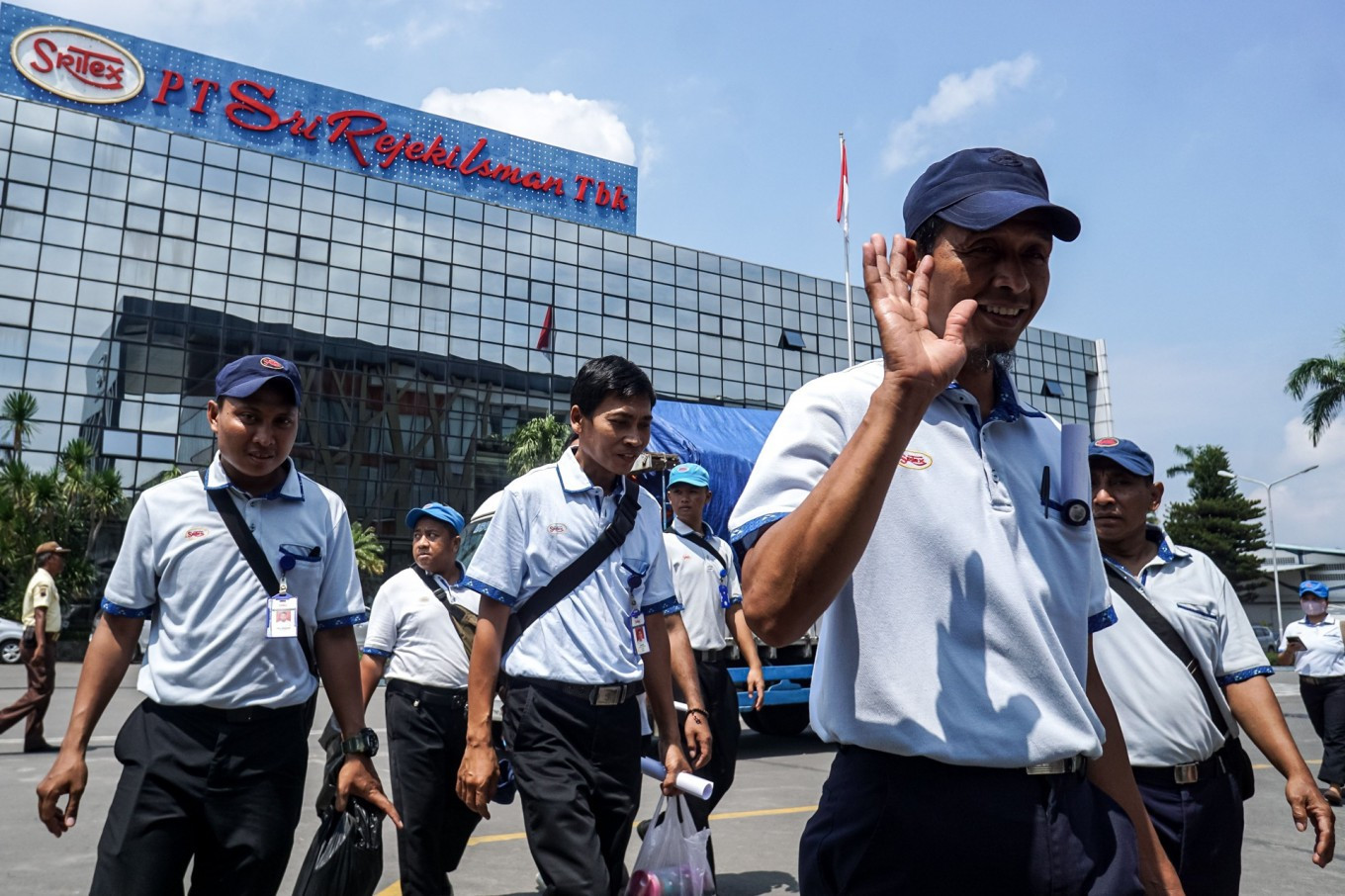News
Textile giant Sritex shuts down, leaving over 10,000 workers jobless
Tenggara Strategics March 11, 2025 Workers wave to the camera as they leave a factory of textile giant PT Sri Rejeki Isman (Sritex) in Sukoharjo, Central Java, on Feb. 28, 2025. Sritex ceased operations on March 1 after being declared insolvent by the Semarang Commercial Court. (Antara/Moh
Workers wave to the camera as they leave a factory of textile giant PT Sri Rejeki Isman (Sritex) in Sukoharjo, Central Java, on Feb. 28, 2025. Sritex ceased operations on March 1 after being declared insolvent by the Semarang Commercial Court. (Antara/Moh
PT Sri Rejeki Isman (Sritex), one of Southeast Asia’s largest integrated textile manufacturers, officially ceased operations on Mar. 1, 2025, following its bankruptcy declaration. The shutdown led to the layoff of 10,965 workers between January and February 2025. In response, President Prabowo has instructed several ministers to devise solutions to help re-employ the affected workers, including leasing factory machinery, attracting investors to acquire the company and facilitating their absorption into other companies.
Sritex was declared bankrupt on Oct. 21, 2024, after a lawsuit filed by Indo Bharat Rayon, one of its raw material suppliers. The company is burdened with Rp 26.2 trillion (US$1.6 billion) in debt, consisting of Rp 25.3 trillion owed to concurrent creditors and Rp 716.6 billion to separate creditors. However, Sritex’s total assets amount to only Rp 10 trillion.
The company had been under financial distress for several years, grappling with mounting debts and multiple lawsuits since 2022. Most of the laid-off workers were employed at four key factories in Central Java operated by the Sritex Group: PT Bitratex Industries (Semarang), PT Sritex (Sukoharjo), PT Primayudha Mandririjaya (Boyolali) and PT Sinar Pantja Djaja (Semarang), highlighting the heavy blow to the region’s manufacturing industry.
To address the mass layoffs, President Prabowo convened a high-level meeting at the Presidential Palace with key officials, including State Secretary Minister Prasetyo Hadi, Manpower Minister Yassierli, State-Owned Enterprises (SOEs) Minister Erick Thohir, members of the Sritex liquidation team and representatives from the company’s labor union. According to Manpower Minister Yassierli, efforts are underway to help re-employ the affected workers within the next two weeks. In parallel, the liquidation team is actively seeking investors to lease Sritex’s assets and resume textile production, aiming to safeguard asset value and restore employment.
The collapse of Sritex is another setback for Indonesia’s manufacturing sector, which is traditionally seen as a key driver of economic growth. However, manufacturing growth has consistently lagged behind the national economy. Growth slowed from 4.89 percent in 2022 to 4.64 percent in 2023, and further declined to 4.43 percent in 2024. Meanwhile, the sector's contribution to gross domestic product (GDP) fell to 18 percent from 2022 to 2024, down from 19.24 percent in 2021 and 19.87 percent in 2020, despite the pandemic's impact.
Sritex’s downfall was aggravated by external pressures, particularly government policies that failed to protect the domestic textile industry. Trade Ministerial Regulation No. 8/2024, which loosened restrictions on textile imports, led to a surge of low-cost Chinese products in the domestic market, undermining local manufacturers.
Experts point out that Chinese textile producers benefit from substantial government subsidies and exemptions from import duties and taxes, creating an uneven playing field that has steadily eroded the competitiveness of Indonesia’s textile industry. According to World Trade Organization (WTO) data, China’s share of the global textile export market grew from 30.4 percent in 2010 to 42.06 percent in 2023. In 2023 alone, China's textile exports were valued at US$134 billion.
The lack of strict import oversight has further fueled the influx of Chinese textiles, contributing to the collapse of local companies like Sritex. In 2023, Sritex reported a sharp decline in revenues, with export sales falling to US$158.66 million from $257.85 million the previous year, while domestic sales dropped to US$166.42 million from $266.71 million.
What we've heard
The government's efforts to revive the Sritex factory cannot be separated from the politics of reciprocity. Several sources said that Sritex was allegedly instrumental in helping Joko “Jokowi” Widodo, even since he ran for mayor of Solo. Sritex's support continued when Jokowi ran as a presidential candidate in 2014 and 2019. The management was reportedly involved in directing thousands of employees to vote for Jokowi.

